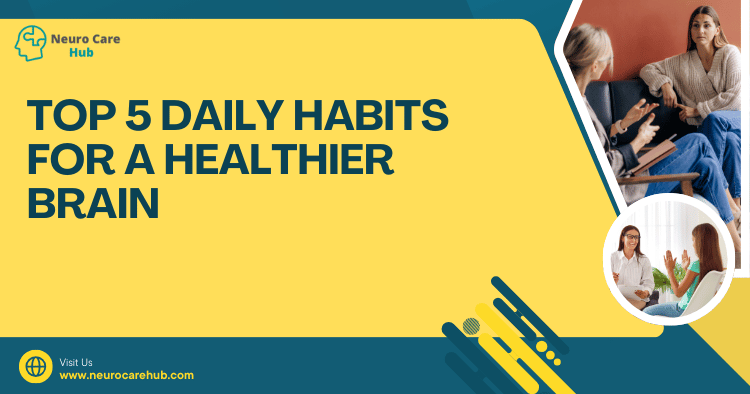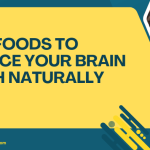Table of Contents
- Introduction
- 1. Stay Physically Active
- 2. Eat a Brain-Boosting Diet
- 3. Engage in Mental Challenges
- 4. Prioritize Sleep
- 5. Cultivate Social Connections
- Conclusion
- FAQs
Introduction
In our fast-paced world, it’s easy to overlook one of our most vital assets—our brain. Just like our bodies, our brains require care and attention to function optimally. In this article, we’ll explore five daily habits that can lead to a healthier brain. Whether you’re looking to improve memory, enhance creativity, or simply stay sharp as you age, incorporating these habits into your routine can make a significant difference.
“Your brain is a muscle. It needs exercise just like any other part of your body to stay strong and healthy.”
1. Stay Physically Active
Regular physical activity is not just about staying fit; it’s crucial for brain health. Exercise promotes blood flow to the brain, which can enhance cognitive function and memory. Moreover, it helps to reduce stress and anxiety levels, which can have negative impacts on mental health.
How Much Exercise is Enough?
The CDC recommends at least 150 minutes of moderate-intensity aerobic exercise each week. This can include walking, cycling, swimming, or even dancing. Here’s a quick breakdown:
| Activity | Duration | Intensity |
|---|---|---|
| Walking briskly | 30 minutes | Moderate |
| Cycling | 30 minutes | Moderate to vigorous |
| Swimming | 30 minutes | Moderate |
Incorporating strength training exercises at least twice a week can also be beneficial. Remember, any movement is better than none!
“Every step you take and every drop of sweat is a step closer to a healthier brain!”
Resources
2. Eat a Brain-Boosting Diet
What you put on your plate can have a profound effect on your brain health. A balanced diet rich in antioxidants, healthy fats, vitamins, and minerals can protect against cognitive decline.
Foods to Include
- Fatty Fish: Rich in omega-3 fatty acids, which are essential for brain health.
- Berries: Packed with antioxidants that may delay brain aging.
- Dark Chocolate: Contains flavonoids, caffeine, and antioxidants.
- Leafy Greens: High in vitamins E and K, which are linked to slower cognitive decline.
Sample Daily Menu
| Meal | Food Options |
|---|---|
| Breakfast | Oatmeal topped with berries |
| Snack | A handful of walnuts |
| Lunch | Quinoa salad with leafy greens |
| Snack | Dark chocolate square |
| Dinner | Grilled salmon with broccoli |
“Let food be thy medicine and medicine be thy food.” – Hippocrates
Resources
3. Engage in Mental Challenges
Keeping your brain active is just as important as physical exercise. Engaging in mental challenges can enhance neuroplasticity, the brain’s ability to form new connections.
Activities to Try
- Puzzles: Crosswords, Sudoku, or jigsaw puzzles.
- Reading: Dive into new genres or topics to expand your horizons.
- Learning a New Skill: Whether it’s a language or an instrument, stretching your mental muscles is key.
Daily Challenge Ideas
| Day | Activity |
|---|---|
| Monday | Complete a crossword puzzle |
| Tuesday | Read a chapter of a new book |
| Wednesday | Try a new recipe |
| Thursday | Watch a documentary |
| Friday | Play a strategy board game |
“Challenge yourself; it’s the only path that leads to growth.”
Resources
4. Prioritize Sleep
Sleep is not just a time for rest; it’s a vital period for memory consolidation and brain repair. Poor sleep can lead to cognitive decline and other mental health issues.
Tips for Better Sleep
- Establish a Routine: Go to bed and wake up at the same time every day.
- Create a Relaxing Environment: Keep your bedroom dark, quiet, and cool.
- Limit Screen Time: Avoid screens at least an hour before bedtime.
Ideal Sleep Duration
| Age Group | Recommended Sleep Duration |
|---|---|
| Adults (18-64) | 7-9 hours |
| Older Adults (65+) | 7-8 hours |
“Sleep is the best meditation.” – Dalai Lama
Resources
5. Cultivate Social Connections
Strong social ties can improve mental health and cognitive function. Engaging with friends and family can boost mood and reduce feelings of loneliness.
Ways to Connect
- Join a Club: Find a group that aligns with your interests.
- Volunteer: Helping others can create bonds and improve your mood.
- Schedule Regular Meet-ups: Make it a point to see friends or family regularly.
Social Connection and Brain Health
Studies show that maintaining social connections may lower the risk of cognitive decline and dementia. So, reach out and stay connected!
“Friendship improves happiness and abates misery, by the doubling of our joy and the dividing of our grief.” – Marcus Tullius Cicero
Resources
Conclusion
Incorporating these five daily habits into your life can lead to a healthier brain and improved overall well-being. Remember, small changes can lead to significant impacts, so start with one habit and gradually incorporate the others. Your brain will thank you!
“Take care of your body. It’s the only place you have to live.” – Jim Rohn
FAQs
1. How long does it take to see improvements in brain health?
Many people report feeling sharper and more focused within a few weeks of adopting healthy habits. However, sustained changes over months and years will yield the best results.
2. Can I improve my brain health at any age?
Absolutely! It’s never too late to start adopting healthier habits. The brain is remarkably adaptable, and changes can lead to improvements at any stage of life.
3. What if I don’t have time for all these habits?
Start small! Incorporate one new habit at a time into your daily routine. Even small changes can make a big difference over time.
4. Is it necessary to follow all five habits?
While all five habits contribute to brain health, any combination of them can be beneficial. Focus on what resonates with you and your lifestyle.
5. Are there any supplements for brain health?
While some people find supplements helpful, it’s best to focus on a balanced diet first. Always consult a healthcare provider before starting any new supplement regimen.
Incorporating these daily habits can empower you to maintain a healthy brain and lead a fulfilling life. For more insights on neuro care, consider reading about the top 5 essential insights on neuro care you need to know and the benefits of early intervention in neuro care. Here’s to your brain health!





